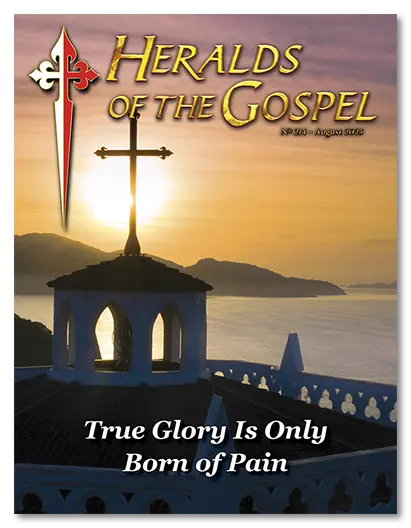St. Thomas Aquinas, the only author whose doctrine the Catholic Church has taken as her own (cf. ST. PAUL VI. Lumen Ecclesiæ, n.24), argues that the main element of Christian doctrine is “salvation effected by the Cross” (Super I Epistolam ad Corinthios, c.I, lect.3).
Jesus Himself prepared His disciples for His redemptive Passion (cf. Mt 16:21), as well as its circumstances: “And as Moses lifted up the serpent in the wilderness, so must the Son of Man be lifted up, that whoever believes in Him may have eternal life” (Jn 3:14-15). The Saviour also said that to truly be His disciple, one must deny oneself and take up one’s cross every day (cf. Lk 9:23)!
Every authentic Christian, therefore, needs to be a “cross-bearer” or a “crusader” in their commitment to the cross. Through it everything is consummated (cf. Jn 19:30) and through it Christ draws everyone to Himself (cf. Jn 12:32). The cross is literally crucial.
However, it causes scandal. Not only to the Sanhedrin, but to the Apostles themselves – to the point that Peter rebuked the Divine Master for announcing it (cf. Mt 16:22). On the very threshold of the Redeemer’s sacrifice, “all the disciples forsook Him and fled” (Mt 26:56) and, after the Crucifixion, we still see the discouragement of the disciples on the road to Emmaus, longing for a merely human restoration of Israel (cf. Lk 24:21).
In the early days of the Church, no shortage of heresies tried to mask the role of the cross, such as Docetism, according to which the Incarnation of Christ was only an appearance and the sacrifice of Calvary a mere allegory because, being God, Jesus could not suffer. The Docetists thus denied in radice the meaning of suffering in Christian life.
It seems that many Catholics today still favour a kind of “practical Docetism”. Like the disciples, they flee from the cross, are indifferent to the workings of the Most High in the world and live as if Our Lord had not been crucified. According to the Aquinate’s statement mentioned above, without the cross – both Christ’s and one’s own – the core of Christianity also disappears.
This mistaken mentality can be seen in certain religious practices: in a sentimentality that makes religion syrupy sweet and averse to the spirit of struggle and of the cross; in the superficiality with which every excuse is made to avoid a greater self-giving to God and neighbour; in the pusillanimity that evades seeking the things that are above, where we find the Wood that draws everyone. These deviations were summed up in a succinct expression by Dr. Plinio Corrêa de Oliveira: “white heresy”, that is, a dilute heresy, essentially Docetist, which has serious consequences for the life of the Catholic.
The secret, therefore, is to find the meaning of life in the cross itself – not to endure suffering in a stoic way, but to discover in it the glory that the Apostle proclaimed: “But far be it from me to glory except in the cross of Our Lord Jesus Christ, by which the world has been crucified to me, and I to the world” (Gal 6:14).
The cross is not wearisome, but sweet, as the hymn Crux fidelis sings; it is also strong and triumphant, because it guides us to the heavenly homeland: “For the word of the cross is folly to those who are perishing, but to us who are being saved it is the power of God” (1 Cor 1:18). Without the cross, therefore, there is no salvation. ◊




Dr. Plinio’s term of “white heresy” is absolutely enlightening. This is a real eye-opener about our salvation — about the sweetness, strength and triumph of the cross, through suffering.